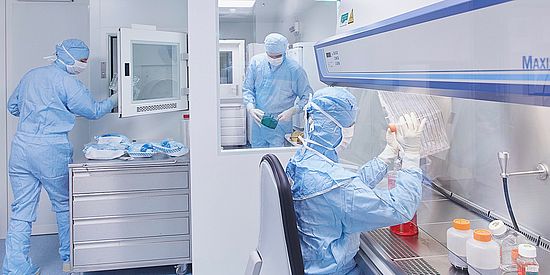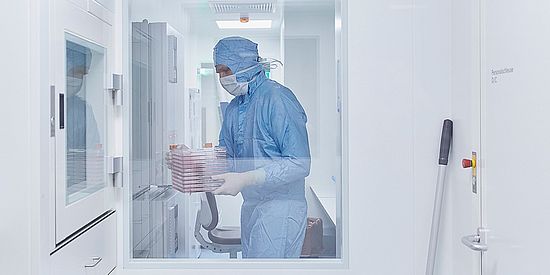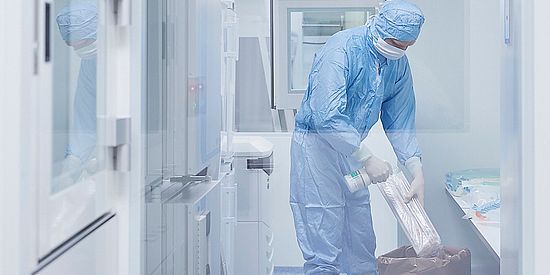GMP Facility for Advanced Therapies (GMP-FAT)
A Quick Overview of Our Core Facility
The GMP Facility for Advanced Therapies (GMP-FAT) owns a Swissmedic licence for the manufacture of novel Advanced Therapy Medicinal Products (ATMPs) to be used in clinical trials for autologous and allogenic cell-, tissue- and gene therapy approaches. Good Manufacturing Practice (GMP) is a system to ensure that medicinal products intended for human use are consistently produced and controlled according to appropriate quality standards.
The GMP-FAT provides two qualified manufacturing sites to the participating user groups, the Department of Biomedicine (DBM) and the University Hospital Basel (USB). One site is located at the DBM and the other is located at Labormedizin University Hospital Basel. These sites are united by a GMP-compliant Pharmaceutical Quality System (PQS) which is maintained by the Quality Assurance (QA)-Team. The latter team comprises six positions of the core facility staff, including a Facility Manager, QC-support, QA, Document Manager and the Qualified Person (QP), who is entitled to release the finished products. Additional GMP-relevant functions need to be provided by the manufacturing groups, including at minimum a Quality Control manager (QC), a Manufacturing Manager and operators performing the manufacturing of the product. Training of all staff (both core staff and users) is organised by the GMP-FAT.
The GMP-FAT also supports the translation of new products into GMP. This process is usually started during the research phase to ensure smooth transition of the processes to regulatory compliant manufacturing and clinical use. Guidance for clinical trial dossiers and support for scientific advice meetings with authorities are also given by the facility staff.
Highlights, Breakthroughs and Current Projects
In order to exploit synergies, the two existing Good Manufacturing Practice (GMP) facilities at the DBM and Labormedizin University Hospital Basel were merged in 2021 to create the GMP-FAT, which owns a unified PQS. The new GMP-FAT is ideally suited to support the regulatory compliance and manufacturing of a diverse array of investigational ATMPs. Currently, tissue engineered cartilage grafts are being manufactured for two international multicentre phase II trials for cartilage defects and degenerative diseases. Moreover, tumour-infiltrating lymphocytes (TILs) for cancer patients are produced in the facility for a phase I/II trial at the USB. Lastly, virus-specific T cells for the treatment of patients suffering from post-transplantation viral infections are manufactured at the facility for a phase I/II trial at the USB.
Further projects currently under validation include the development of a platform for the production of in-house CAR-T cells, specific to different tumours and expanded virus-specific T cells, more potent against EBV infections. In the more distant future, projects for tissue engineered bone will also be brought into the GMP facility. The GMP-facility also supports the two Innovation Foci for Cell Therapy and for Regenerative Surgery.
What is very special and unique about the GMP Facility for Advanced Therapies?
The GMP Facility for Advanced Therapies is one of the very few existing GMP facilities in an academic setting in Switzerland. This fact provides a unique opportunity for research groups at the DBM and USB as the lack of regulatory knowledge and scarcity of suitable facilities is often an insurmountable hurdle in translating basic research into clinical applications. The extensive knowledge of the QA-Team in GMP rules, quality assurance, regulatory affairs and clinical trials as well as the training provided, enables translation towards the clinic also for beginners in GMP-compliant manufacturing. Moreover, the GMP-FAT provides its services free of charge, and users only have to pay for project-specific costs of their consumables and testing, and bring the required personnel.
Equipment
We provide two fully-equipped and qualified GMP manufacturing laboratories (GMP grades A-D), including supply systems for pharmaceutical gases, computerised monitoring systems for measurements of environmental physical parameters, and an array of devices (incubators, fridges, freezers, biosafety cabinets. cell processing systems, bioreactors, etc.) which are also partly connected to the alarm unit of the USB.
Social Media



